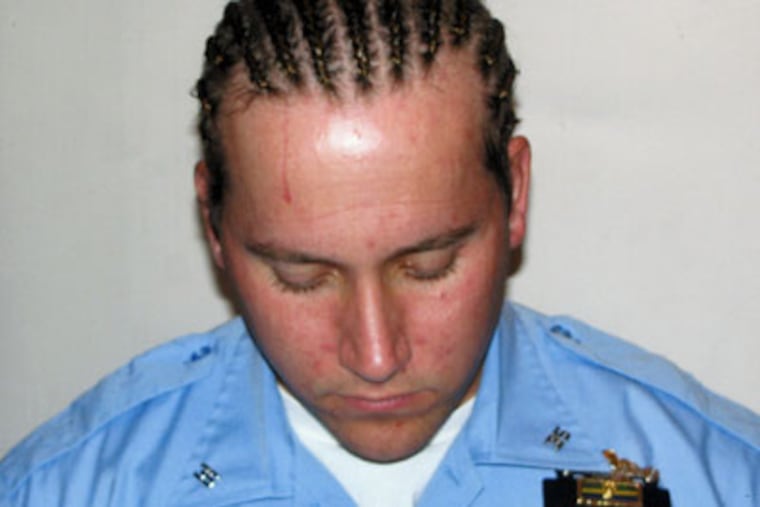Cop with cornrows pulled from street duty
PHILADELPHIA - A cop who got cornrows was ordered off the street and kept on desk duty for two days until he cut his braids off, sources said. While dozens of black officers across the city wear cornrows, Officer Thomas Strain is white.

PHILADELPHIA - To get booted off the street, a police officer has to do something pretty serious - like shoot a suspect or be accused of brutality.
But in the 35th District, which covers Logan, Olney and adjacent neighborhoods, apparently a hairdo will do it.
A cop who got cornrows was ordered off the street and kept on desk duty for two days until he cut his braids off, sources said.
While dozens of black officers across the city wear cornrows, Officer Thomas Strain is white. So when the five-year veteran showed up for work Sept. 3 with the traditionally black hairstyle, it didn't take long for his colleagues - or his bosses - to notice.
"They pulled him out of roll call and took him right up to the inspector's office," said an officer who asked to remain anonymous.
Reached last week, Strain declined to comment about the hair hubbub.
But multiple officers in the 35th say it's been hot gossip, overshadowed only by worries of potential police layoffs, which were averted Thursday when the state agreed to help alleviate the city's budget woes.
"It's absolutely discriminatory," said one officer. Strain's cornrows 'do "was neat. It was above his collar. It's not like he shaved a Nazi sign or something anti-black or anti-Hispanic on his head. It's just cornrows. I don't know what the problem is."
The problem, police spokesman Lt. Frank Vanore said, is that Strain's superior didn't feel his cornrows were "professional."
Ordering Strain to chop them off had nothing to do with discrimination, added Vanore, who spoke with Inspector Aaron Horne about the incident.
Horne, who oversees the Northwest Police Division, which includes the 35th District, is the supervisor who directed Strain to banish the braids.
"The policy's the policy, it doesn't matter what race you are," Vanore said.
Police policy requires officers to have "clean, properly trimmed and combed hair" that doesn't prevent them from wearing their uniform hat "in a military-manner," Vanore said.
The policy prohibits "unnatural" hair colors such as blue, purple or green but doesn't ban specific styles, such as cornrows, mohawks, dreadlocks or bouffants.
Vanore didn't see Strain's cornrows, but speculated that they may have kept his hat from fitting his head in the required military manner. He couldn't explain why black officers with cornrows weren't ordered to get haircuts - unless they're women, because the hair policy for female officers is slightly more permissive.
Still, while the division inspector did instruct Strain to get a haircut, Vanore emphasized, the officer wasn't formally disciplined.
This isn't the first time an officer's appearance has caused commotion in the 35th District.
Officer Kimberlie Webb in 2005 sued the city and the police department after she was barred from wearing a hijab, or Muslim head scarf, on the job. A federal appeals court last April upheld the department's policy, saying religious garb imperils the department's appearance of "religious neutrality."
Other police departments have endured hair hullabaloos too.
Baltimore in 2007 tried to ban its officers from wearing cornrows, mohawks and dreadlocks, shaving designs into the hair or fashioning hair into "sculpture."
But officers and others objected on civil-rights grounds, and the ban was never implemented.
Two officers in Dallas in 2001 claimed they lost their jobs because they refused to cut off their dreadlocks. A Dallas police spokesman said those officers were fired for other disciplinary reasons unrelated to hairstyle.
As for Strain, friends describe him as a hardworking cop who hails from a family of police officers and who adores police work.
The former Marine served in Iraq, where he twice survived explosions when his Hummer hit roadside bombs in 2006, co-workers said.
"He's a guy that, when things go bad, you want him there," one officer said.
John McGrody, vice president of the Philadelphia Fraternal Order of Police, said the union has "no position" on the discrimination claim.
"If the officer's hairstyle is consistent with the policy, it shouldn't affect him," he said.